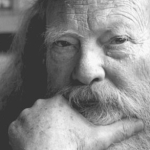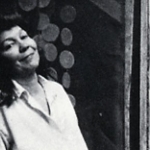(Double Portrait in a Mirror)
I
To the meeting despair of eyes in the street, offer
Your eyes on plates and your liver on skewers of pity.
When the Jericho sky is heaped with clouds which the sun
Trumpets above, respond to Apocalypse
With a headache. In spirit follow
The young men to the war, up Everest. Be shot.
For the uncreating chaos
Claims you in marriage: though a man, you were ever
a bride.
Ever among the supple surface of summer-brown muscle
The fountaining evening chatter under the stars,
The student who chucks back his forelock in front of a glass,
You only longed for your longing to last.
The engine in you, anxiety,
Is a grave lecher, a globe-trotter, one
With moods of straw, the winds that blow him, aeroplanes.
'Whatever happens, I shall never be alone,
I shall always have a fare, an affair, or a revolution.'
II
I am so close to you
I will confess to you
I am all that you do.
In thoughts where pity is the same as cruelty
Your life is mine. Whether
What fears and falters is myself
Or yourself — all
The apprehension of this time,
We are both one.
At night I'm flooded by the future
Incoming tide of the unharnessed war.
Beyond the blacked-out windows of our nightmare
Facts race their hundred miles an hour
In iron circles on an iron plain.
The riders of those race-cars lose
All sense of where they are.
Ridden by their speed, the men
Are their machines.
III
All I can foresee now — more I shall learn —
Is that our fear creates its opposite.
Our peace is war.
When you choose a mirror for a lover
It shows you your own image as a gunman.
You are a ghost amid the flares of shellfire
Less living than
The last war dead whose veins of mineral
We mine for here.
IV
Shall I ever reach
The field enclosed by stones
In the high mountains
Where the scytheless wind
Flushes the swayed grasses?
Where clouds without rain
Add to the sun
Their mirroring shine?
The simple machinery is here
Clear room clear day clear desk
And the hand with its power
To make the heart pour
Into the word, as the sun
Moves upward through the corn.
Meanwhile, where nothing's sacred
And love no longer willed
Nor our true purpose conscious,
Holy is lucidity
And the mind that dare explain.


















Comment form: